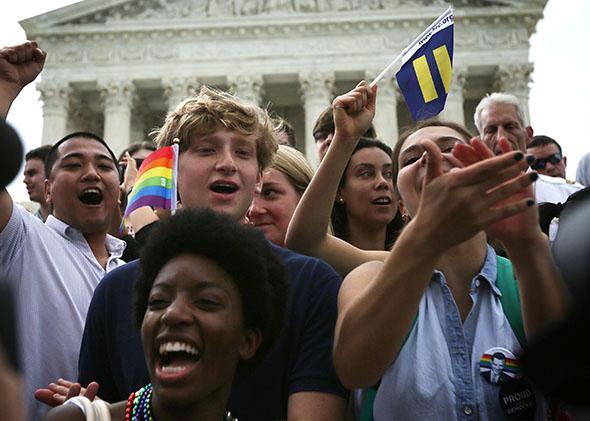Friends,
Racing from the Union Station Metro station to court on Friday morning, I found myself a few steps behind a very large man dressed as Ruth Bader Ginsburg, right down to the fingerless lace gloves. It was pretty clear that today would be a very different day at the court.
Arrayed before the justices this morning as the session opened were the pioneers of the legal fight for LGBT civil rights, among them Paul Smith (who argued Lawrence v. Texas), Mary Bonauto, and Doug Hallward-Driemeier (who argued the marriage cases back in April). Several of the plaintiffs from the cases, including Michael De Leon and Gregory Bourke and of course, Jim Obergefell, were also in the courtroom, as was retired Justice John Paul Stevens.
Justice Anthony Kennedy read his prepared opinion summary rather quickly and somewhat tonelessly. When he opened with the observation that marriage has been between one man and one woman since the dawn of history, spectators looked anxious. This was precisely how he had opened his questioning in oral arguments in April. By the time he explained that under the Due Process clause, certain rights—to dignity and autonomy—were fundamental, people were beginning to weep. (I count nine repetitions of the word dignity in the majority opinion, a fact not lost on the dissenters.)
It was when Kennedy turned to the mention of children—the hundreds of thousands of children being raised by same-sex couples who face stigma and humiliation—that he became most animated. He read from the last paragraph of his opinion, about how respect for marriage is what drives these same-sex couples and that they merely seek equal dignity in the eyes of the law. The chamber was almost silent.
When the chief justice read from his dissent, Kennedy sat, stony faced, beside him, listening to comparisons between the court’s holding today and the Lochner era. When the chief justice read from the portion of his dissent explaining that “five lawyers” had ordered the states to recognize gay marriage—adding, “Just who do we think we are?”—you could hear a pin drop. The room got even quieter when Roberts cautioned what seemed to be the array of civil rights lawyers seated before him that:
[H]owever heartened the proponents of same-sex marriage might be on this day, it is worth acknowledging what they have lost, and lost forever: the opportunity to win the true acceptance that comes from persuading their fellow citizens of the justice of their cause. And they lose this just when the winds of change were freshening at their backs.
He concluded with the line that is already emblematic of his whole dissent:
If you are among the many Americans—of whatever sexual orientation—who favor expanding same-sex marriage, by all means celebrate today’s decision. Celebrate the achievement of a desired goal. Celebrate the opportunity for a new expression of commitment to a partner. Celebrate the availability of new benefits. But do not celebrate the Constitution. It had nothing to do with it.
Roberts then turned to Justice Antonin Scalia, who had been leaning way back in his chair throughout the marriage announcements, to read his opinion in the second case of the day—about the Armed Career Criminal Act. Scalia—Scalia-like—promptly quipped, “Don’t go away,” before beginning to read.
I am working my way through the various dissents in Obergefell right now, but I should add that the scene on the court plaza when we left the building this morning was remarkably quiet, emotional, and dignified—other than the fact that the crowd would not remain on the sidewalk as instructed and had taken over the fountains, benches, and most of the marble plaza. We can, and will, spend days talking about the complicated relationship between the Equal Protection and Due Process clauses. But on the plaza today, people were mostly just talking about their families.
Read the previous entry by, Mark Joseph Stern. Read the next entry, by Kenji Yoshino.
Read more of Slate’s coverage of same-sex marriage at the Supreme Court.
Other great articles in Slate:
